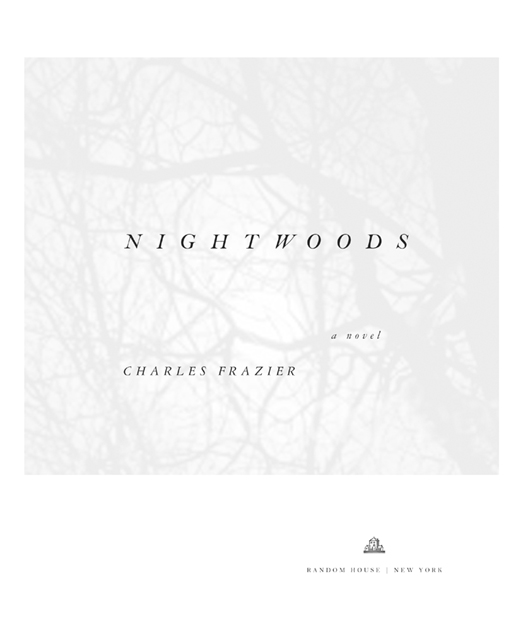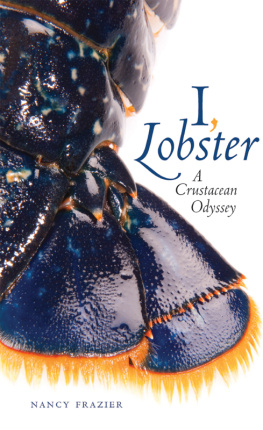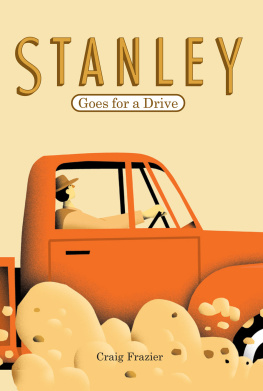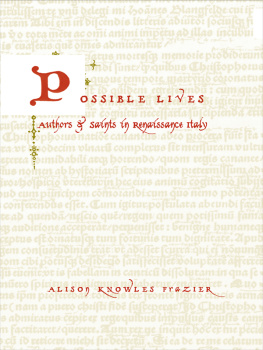Charles Frazier - Nightwoods
Here you can read online Charles Frazier - Nightwoods full text of the book (entire story) in english for free. Download pdf and epub, get meaning, cover and reviews about this ebook. year: 2011, publisher: Random House, genre: Detective and thriller. Description of the work, (preface) as well as reviews are available. Best literature library LitArk.com created for fans of good reading and offers a wide selection of genres:
Romance novel
Science fiction
Adventure
Detective
Science
History
Home and family
Prose
Art
Politics
Computer
Non-fiction
Religion
Business
Children
Humor
Choose a favorite category and find really read worthwhile books. Enjoy immersion in the world of imagination, feel the emotions of the characters or learn something new for yourself, make an fascinating discovery.

- Book:Nightwoods
- Author:
- Publisher:Random House
- Genre:
- Year:2011
- Rating:5 / 5
- Favourites:Add to favourites
- Your mark:
- 100
- 1
- 2
- 3
- 4
- 5
Nightwoods: summary, description and annotation
We offer to read an annotation, description, summary or preface (depends on what the author of the book "Nightwoods" wrote himself). If you haven't found the necessary information about the book — write in the comments, we will try to find it.
Nightwoods — read online for free the complete book (whole text) full work
Below is the text of the book, divided by pages. System saving the place of the last page read, allows you to conveniently read the book "Nightwoods" online for free, without having to search again every time where you left off. Put a bookmark, and you can go to the page where you finished reading at any time.
Font size:
Interval:
Bookmark:


Nightwoods is a work of fiction. Names, characters, places, and incidents are the products of the authors imagination or are used fictitiously. Any resemblance to actual events, locales, or persons, living or dead, is entirely coincidental.
Copyright 2011 by 3 Crows Corporation
All rights reserved.
Published in the United States by Random House,
an imprint of The Random House Publishing Group,
a division of Random House, Inc., New York.
R ANDOM H OUSE and colophon are registered
trademarks of Random House, Inc.
LIBRARY OF CONGRESS CATALOGING-IN-PUBLICATION DATA
Frazier, Charles.
Nightwoods : a novel / Charles Frazier.
p. cm.
eISBN: 978-0-679-64414-9
1. TwinsFiction. 2. North CarolinaHistory20th centuryFiction.
3. North CarolinaRural conditionsFiction. I. Title.
PS3556.R3599N54 2011
813.54dc22 2011014629
www.atrandom.com
Jacket design: David Stevenson, based on a photograph Marshall Shunk
v3.1
You cant even cross a river
Without having to pay a toll.
ARCHILOCHOS (SEVENTH CENTURY B.C.)

L UCES NEW STRANGER CHILDREN were small and beautiful and violent. She learned early that it wasnt smart to leave them unattended in the yard with the chickens. Later shed find feathers, a scaled yellow foot with its toes clenched. Neither child displayed language at all, but the girl glared murderous expressions at her if she dared ask where the rest of the rooster went.
The children loved fire above all elements of creation. A heap of dry combustibles delighted them beyond reason. Luce began hiding the kitchen matches, except the few she kept in the hip pocket of her jeans for lighting the stove. Within two days, the children learned how to make their own fire from tinder and a green stick bowed with a shoelace. Tiny cavemen on Benzedrine couldnt have made fire faster. Then they set the back corner of the Lodge alight, and Luce had to run back and forth from the spring with sloshing tin buckets to put it out.
She switched them both equally with a thin willow twig until their legs were striped pink, and it became clear that they would draw whatever pain came to them down deep inside and refuse to cry. At which point Luce swore to herself she would never strike them again. She went to the kitchen and began making a guilty peach pie.
LUCE WAS NOT MUCH MATERNAL . The State put the children on her. If she had not agreed to take them, they would have been separated and adopted out like puppies. By the time they were grown, they wouldnt even remember each other.
Though now that it was probably too late to go back, maybe that would have been a good thing. Separate them and dilute whatever weirdness they shared and ignited between them. Yet more proof, as if you needed it, that the world would be a better place if every-damn-body didnt feel some deep need to reproduce. But God in his infinite wisdom had apparently thought it was an entertaining idea for us to always be wanting to get up in one another.
Also, the children were here, and what was Luce to do? You try your best to love the world despite obvious flaws in design and execution. And you take care of whatever needy things present themselves to you during your passage through it. Otherwise youre worthless.
Same way with the Lodge. Luce didnt own it. She was the caretaker, sort of. Some would call her a squatter now that the old man was dead. But nobody else seemed interested in keeping it from growing over with kudzu until it became nothing but a green mound.
Back at the edge of the previous century, the Lodge had been a cool summer retreat for rich people escaping the lowland steam of August. Some railroad millionaire passing through the highland valley in his own railcar had a vision, or possibly a whim, to build an earthen dam, back the river up, fill the upper end of the valley with water right to the edge of the village. Then, on the far side, build a log lodge of his own design, something along the lines of the Old Faithful Inn, though smaller and more exclusive. He must have been a better railroad executive than architect, because what he built was a raw outsized rectangle, a huge log cabin with a covered porch looking down a sweep of lawn to the lake and across the water to the town. Evidently, rich people were satisfied by simpler things in the yesteryears.
Now the millionaires and the railroad were gone. But the lake remained, a weird color-shifting horizontal plane set in an otherwise convoluted vertical landscape of blue and green mountains. The Lodge persisted as well, a strange, decaying place to live in alone, though. The main floor was taken up by the common rooms, a voluminous lobby with its massive stone fireplace and handsome, backbreaking Craftsman armchairs and settles, quarter-sawn oak tables and cabinets. A long dining room with triple-hung, lake-view windows and, behind swinging doors, a big kitchen with a small table where the help once crowded together to eat leftovers. Second floor, just narrow hallways and sleeping chambers behind numbered six-panel doors with transom windows. Third floor, way up under the eaves, a dark smothering rabbit warren of windowless servants quarters.
WHEN SHE LIVED ALONE , Luce didnt go to the upper floors often, but not out of fear. Not really. It was little but bedsteads and cobwebs up there, and she didnt want to believe in ghosts or anything similar. Not even the portents of bad dreams. Yet the fading spirit world touched her imagination pretty strong when she was awake at three in the morning, alone in the big place. The dark sleeping floors, with their musty transient pens and cribs for the guests and their help, spooked her. The place spoke of time. How youre here and then youre gone, and all you leave for a little while afterward are a few artifacts that outlive you.
Case in point, old Stubblefield, who had owned the Lodge for the past few decades. Luce visited him several times during his dying days, and she was there at the end to watch the light go out of his eyes. In the final hours, Stubblefield mostly cataloged his possessions and listed who should get what. His concerns were largely real estate, all his holdings to go to his sole useless grandson. Also a few valuable objects, such as his dead wifes silver service and lace tablecloth, perfect but for a slight rust stain at one corner. Barely noticeable. The silver candleholders were a heavy weight on Stubblefields mind because his wife had loved them so much. Oddly, he left them to Luce, who didnt love them at all and probably never would.
Easy to be disdainful and ironic toward others false values. Still, Luce hoped that when she was at the same thin margin of life she would be concerned with looking out the window to note the weather or the shape of the moon or some lone bird flying by. Certainly not a bunch of worn-out teaspoons. But Luce was half a century younger than old Stubblefield, and didnt know how shed think and what she would value if she made it that far down the road. All her life, the main lesson Luce had learned was that you couldnt count on anybody. So she guessed you could work hard to make yourself who you wanted to be and yet find that the passing years had transformed you beyond your own recognition. End up disappointed in yourself, despite your best efforts. And thats the downward way Luces thoughts fell whenever she went upstairs into the dreary past.
Font size:
Interval:
Bookmark:
Similar books «Nightwoods»
Look at similar books to Nightwoods. We have selected literature similar in name and meaning in the hope of providing readers with more options to find new, interesting, not yet read works.
Discussion, reviews of the book Nightwoods and just readers' own opinions. Leave your comments, write what you think about the work, its meaning or the main characters. Specify what exactly you liked and what you didn't like, and why you think so.










